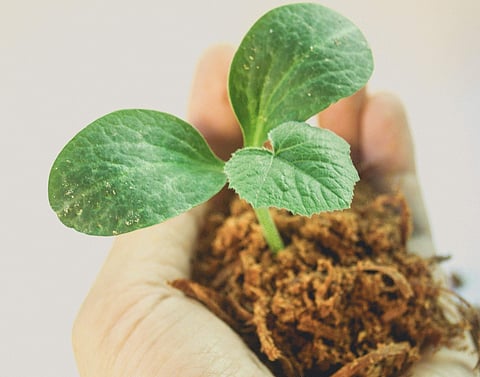

HYDERABAD: In an idea that could help reduce the cost of electricity generation by leaps and bounds, a Telugu academic based in Nagpur has developed a way to generate current from live plants.
Hari Kumar Naidu, an engineering professor from Nagpur, who was showcasing his innovation at the Rural Innovators Startup Conclave at NIRDPR on Friday, said that the idea was based on photosynthesis.
“When photosynthesis takes place, glucose is generated -- which is nothing but a mixture of carbon, hydrogen, oxygen and water. This glucose is swallowed by bacteria. Through analysis, we discovered that when bacteria were consuming it, they were releasing electrons. As an engineer, what we tried to do is capture that electron and generate electricity,” he explained.
The type of release which Naidu is talking about is called rhizodeposition and its products -- rhizodeposits -- are renewable bio energy substrates.
These substrates react with bacteria to generate electricity. “We have used different electrodes like copper, zinc, aluminium and so on,” he said.
In 2017, Naidu presented the same idea as a speaker in International Conference on Energy, Environment, Development, and Economics (EEDE) in Greece.
Naidu claims that Netherlands had implemented a similar technology in the country. As for why the same hasn’t happened in India, Naidu shies away from answering, indicating that ‘bureaucracy’ may have played a part.
Solar-powered sensors with just 3% error margin
Harsh Agarwal and Nikita Tiwari of NEERx Technovation have developed a sensor with the help of ISRO, which when put into any kind of liquid or solid substance, will be able to characterise its composition. Termed SHOOL (Smart Sensor for Hydrology and Land Application), the sensor measures parameters such as electrical conductivity, moisture, salinity and temperature, when inserted in soil.
“Our sensors offer errors below 3 per cent,” Agarwal said. As of now, the sensors are powered with solar energy
There is a need to decentralise rural income, says Union minister
Reminiscing the days when rural India was better off because it survived on an alternate finance system, Union Minister for Rural Development Narendra Singh Tomar on Friday said that there was a need to generate decentralised rural income, in order to solve the unemployment issue.
Tomar was inaugurating the Rural Innovators Startup Conclave at the National Institute of Rural Development and Panchayat Raj